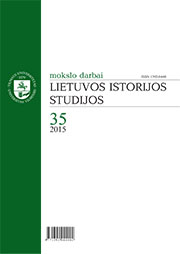NEFORMALAUS INTELIGENTŲ TINKLO VEIKLA TARP SOVIETINIO SISTEMIŠKUMO IR ALTERNATYVUMO: „GARAŽŲ ISTORIJA“ (1977–1978)
THE SOVIET INTELLECTUALS’ INFORMAL NETWORK BETWEEN ALTERNATIVE AND WITHIN-SYSTEMNESS: THE “GARAGE CASE” (1977–1978)
Author(s): Valdemaras KlumbysSubject(s): Cultural history, Civil Society, Local History / Microhistory, Political history, Social history, History of Communism
Published by: Vilniaus Universiteto Leidykla
Keywords: networking; soviet period; intellectuals; collective action; opposition; trust; informal ties
Summary/Abstract: This paper analyses one of the earliest collective actions of intellectuals. It rose against the decision of Soviet authorities to build an underground garage in the center of the Vilnius old city. The network of activists collected signatures of prominent Lithuania’s intellectuals to the petitions against this decision and managed to deliver these petitions straight into the hands of the first secretary of the Lithuanian communist party, and this was the main cause of the success of this action – excavations were stopped, and the well was back-filled. The social network analysis was used to analyze the functioning of the network of intellectuals. The main themes of the research are the structural characteristics of the network (the structure of the network and how it functioned); the tactics of the collective action; the external circumstances that benefited success (widespread norms within society such as trust and collaboration, the significance of formal and informal social statuses in dependence on the context). The research shows that even the anti-systemic actions of intellectuals were quite dependent on the within-system actions, so the informal networks of intellectuals weren’t independent despite the anti-systemic values that prevailed within them.
Journal: Lietuvos istorijos studijos
- Issue Year: 2015
- Issue No: 35
- Page Range: 102-119
- Page Count: 18
- Language: Lithuanian

